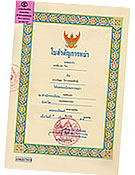Foreigners living in Thailand often require the same personal legal documents with the same content. They want to marry a Thai national and want to protect their personal assets through a prenuptial agreement. They want to divorce a Thai national and need a divorce settlement agreement. They want to leave certain assets in Thailand to a Thai national and want to make last will and testament. Or they want a power of attorney to appoint another person in Thailand to act as their agent on their behalf. Often these documents are more or less standard documents and foreigners do not need to visit a Thai lawyer in his office to obtain such documents. Samuiforsale กฏหมายไทย isn’t simple
- Thai Last Will and Testament
- Thai Prenuptial Agreements
- Thai Divorce Agreements
- Thai Power of attorney service
Last will and testament
If you have definite ideas on how you require your estate in Thailand to be distributed when you die then you must make a last will and testament. A last will insures that your assets are given to those who you have entrusted your estate to upon your death. If you are a foreigner with assets in Thailand and you do not have a last will governing your assets in Thailand your wishes may not necessarily be carried out and international private law and statutory inheritance laws shall determine what happens to your properties in Thailand when you die.
Foreigners with assets in Thailand are generally permitted to dispose of their Thai assets according to a 'last will and testament' made in another country. Foreigners may also choose to make a last will and testament specifically for assets in Thailand, excluding assets in other countries through a limited jurisdiction clause in the will. The execution of a last will or distribution of an estate requires a Thai court procedure and approval in which an executor/ administrator of the estate will be appointed or will be given permission to wind up the foreigner's estate in Thailand. A Thai will could dispose of properties in Thailand separately and differently from assets in other countries.
See also
Prenuptial agreements
A prenuptial agreement in Thailand (before marriage) is a contract governing personal and marital property of husband and wife and is entered into by two people planning to marry. The content of a prenuptial agreement under Thai law primarily includes financial arrangements and provisions for personal assets, management of joint assets and the potential division of common assets should the couple divorce. A prenuptial agreement must be made prior to the marriage and entered into the marriage register simultaneously with the marriage at the government office (amphur) where the marriage takes place or it will be void and the civil code sections 1465 to 1493 (the statutory matrimonial property regime) will govern the terms of property of husband and wife.
See also
Divorce and divorce settlement agreement
A divorce in Thailand can be quick, simple and hassle free if both parties agree to divorce and agree on the terms of the divorce. In the case the couple agree to divorce and there is no disagreement on the division of properties and matters like child custody, both parties can present themselves at a local amphur in Thailand and apply for a divorce. A divorce in Thailand on mutual consent is quick and easy. Before you turn up at the local amphur it is recommended to have a divorce settlement agreement prepared by a qualified lawyer.< A divorce settlement agreement covers all important legal aspects of the divorce and arrangements between the parties.
A divorce settlement agreement covers all important legal aspects of the divorce and arrangements between the parties.
If husband and wife want to divorce but cannot agree on the terms of the divorce they must follow a court divorce procedure and they each must obtain the service of a lawyer who will represent them at the court. This is a more costy and time consuming procedure to divorce and requires several court appearances. In a contested divorce the court will end the marriage and among others divide the couples assets and debts according to the law and individual circumstances.
See also
Power of attorney
A power of attorney lets you appoint someone you trust to manage important matters on your behalf. A power of attorney is used to hand over control of your affairs to another person. The 'principal' empowers another individual 'attorney-in-fact' to act on his behalf. The attorney in fact takes control of the principal’s business and legal dealings subject to the power of attorney. A power of attorney in Thailand can be used for short-term specific transactions which the principal cannot handle himself, or can continue in the event that the principal becomes incapacitated or mentally ill. Government bodies in Thailand often require their own specific standard power of attorney (in Thai script) when someone is acting on behalf of another person in official procedures.
See also



